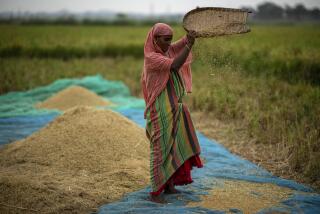World Food Glut Puts Europe in a Quandary
- Share via
LONDON — From the American Midwest to the Principality of Wales, farmers are going broke.
There is a world glut of food. African hunger results only from failure to distribute food. The glut has caused prices to hit rock-bottom, with wheat down 35% since fall.
Across the globe, new strains of seed, fertilizers and pesticides--plus Space Age irrigation schemes like those engineered in the Saudi Arabian desert to grow wheat--are creating the surpluses.
And subsidies to farmers, direct and indirect, paid by numerous governments compound a burgeoning crisis.
Strategic Goal
Saudi officials, for example, defend spending oil dollars on subsidizing wheat cultivation on grounds that food self-sufficiency is a strategic goal.
Huge farm subsidies are in effect in the European Economic Community, and EEC ministers now concede that they are scandalous.
EC subsidies were introduced so that no European should ever starve and so that Europe’s peasant farmers should enjoy a standard of life at par with the urban workers.
Bulging Warehouses
Now, there is talk in Europe of paying farmers to let their land lie fallow.
EEC warehouses are stacked with 16 million metric tons of unsold grain, 1.3 million tons of butter and nearly 600,000 tons of beef. And while children in parts of the Third World starve, the EEC talks of turning surplus butter into soap.
That may seem callous, but several experts on agricultural trade reply that the dumping of subsidized food in developing countries can actually cause misery in the Third World.
Some Third World governments, fearful of urban unrest, are keen to provide cheap food in their capital cities. So they buy cheap food on the world market and watch the prices paid to their own farmers fall. Hunger begins when the countries run short of hard cash.
Rich Also Hurt
Subsidies can hurt in rich nations too. Wholesale rice in Japan costs up to 10 times the world average. A home within commuting distance of Tokyo can cost $300,000.
If Japan stopped subsidizing farmers and bought rice on the world market, there might be more land to build on. In theory, both food and owning a home might cost less--although farmers would be unlikely to see it quite so simply. And farmers, as the EEC has learned, are a powerful lobby.
These and other issues were discussed in London recently when leaders in the agricultural industry gathered at a symposium, called Agra-Europe.
“There’s an obscene misallocation of resources in Japan, the EEC and the U.S. which is imposing an ever-increasing burden on taxpayers and consumers,” said Mike Moore, Minister of Overseas Trade for New Zealand, the keynote speaker at the conference. His nation depends on agricultural exports.
‘Simple Solutions’
“The solutions are simple,” he said. “It’s only vested interests that complicate them. Feed the hungry, break the Third World debt cycle and rearm the economies of Europe, the U.S. and Japan by transferring the agricultural subsidies to viable new areas of commerce, dictated by the market.”
Peter Pooley, deputy director general for agriculture at the European Commission, said that the EEC is “well and truly launched on radical reform, to the surprise of many.” But, he added, “We are at the end of the beginning, not the beginning of the end.”
He, and others, cited oil seeds--rape and sunflower seed--as the latest example of how well-intentioned efforts to manage agriculture risks have going wrong.
The EEC has encouraged farmers to grow oil seeds instead of grain. But Thomas Mielke, associate director of the weekly Oil World, said this had cost more money than it has saved.
Potential U.S. Dispute
Oil seeds also could involve a trade dispute with the United States, since the EEC is expected to renew proposals shortly for a tax on vegetable oils and fats. Americans would regard that as a barrier to their soybean exports to Europe.
U.S. officials concede that there are farm subsidies in the United States but say that these are of recent origin and are a necessary counter to EEC subsidies.
“I feel sorry for countries like Australia, New Zealand and Argentina,” a U.S. diplomat said. “They are going to feel pain over the next few years. But our policy is the only way to put pressure on the European Community to dismantle its system.”
More to Read
Sign up for Essential California
The most important California stories and recommendations in your inbox every morning.
You may occasionally receive promotional content from the Los Angeles Times.










